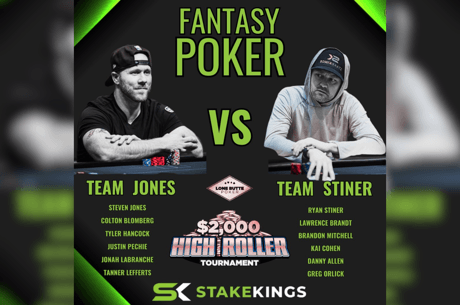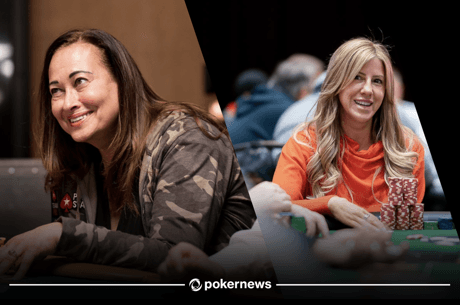Red Rock Casino Bad Beat Jackpot Payout Dispute Continues

For many low-to-mid stakes cash players, paying the rake is a necessary evil. That extra dollar that goes into the Bad Beat Jackpot fund, on the other hand, is considered more of a necessary (and welcomed) gamble.
Bad beat jackpots have lured patrons to the tables for years, and while winning the WSOP Main Event or another major poker title is the elusive dream of many a player, the majority of those grinding it out at lower stakes set their sights on hitting the lottery, in a sense.
Winning the bad beat jackpot is an exciting prospect, and while the majority of players will go all their years at the tables without being on the giving or receiving end of the big one, most will be in the room when one hits, or even at the table if they’re lucky, in which case they're often entitled to a small percentage of the jackpot in the “table share.”
But getting quads or straight flush beat, in a sizable card room with a healthy bad beat jackpot, remains the ultimate dream for many.
Sometimes, though, the dream can become a nightmare. What if a player seemingly locked up a bad beat jackpot payout but some small piece of red tape prevented he or she from collecting?
What if a player seemingly locked up a bad beat jackpot payout but some small piece of red tape prevented he or she from collecting?
There are many rules in card rooms to protect against things like collusion, in place for the protection of all players. Such rules are necessary to uphold the integrity of the game. Imagine if players were allowed to show cards whenever they wanted, or to act out of turn to influence action with no repercussions, or to signal to a tablemate about the strength of their holdings. These things would severely disrupt the game and players' experiences at the tables.
Everyone grinding at the poker tables in a room that offers a bad beat jackpot pays into the jackpot pool. In most rooms, this comes in the form of $1 coming out of every pot for the purpose of building the fund that some lucky players will hit at some point.
The fact that all players pay in means that all players should reasonably expect the room’s management to protect the integrity of the game, and pay out the coveted jackpot only when the players involved in the bad beat-eligible hand have followed the established rules that protect against collusion.
The Red Rock Case
July 7, 2017 was an exciting day in the Las Vegas poker scene with the World Series of Poker Ladies Event, the $10,000 Seven Card Stud Championship and a $1,000 WSOP.com online event all getting started at the Rio, and everyone getting excited about the biggest poker tournament in the world, the WSOP Main Event, kicking off the next day.
But the action at the Rio wasn’t the only excitement brewing. The bad beat jackpot at Red Rock Casino, one of the bigger off-strip casinos to offer a jackpot, had inched up to $120,000.
If you’ve never played at Red Rock, it’s not exactly one of the Vegas strip casinos, but it’s also not what you think of when you hear “off-strip casino poker room.”
Red Rock is best described as a classy room with local clientele — people who live in Vegas, mostly in and around the upscale area of Summerlin, which is a popular location for retirees. It’s a friendly, small room with 20 tables, clean and comfortable, and attracts an older crowd on average than you are likely to find at a Vegas strip poker room.
On that fateful day, 83-year-old Avi Shamir made a straight flush, only to have the ultimate dream of that huge hand being bested by an even bigger hand come true — a higher straight flush held by Leonard Schreter,
As is customary, when the jackpot hand went down, a sign lights up at all Station poker rooms so players eligible for the “room share” of the pot can be recorded and paid out if the jackpot is verified. Next, information of players involved in the hand and at the table is collected, while supervisors verify using surveillance the eligibility of the bad beat hand — all pretty standard procedure. But the story gets a bit complicated.
Red Rock BBJ Rules
According to the Station Casinos Jumbo Hold’em Poker Progressive Jackpot the jackpot resets at $75,000 and the qualifying hand is aces full of jacks beaten by quads or better. When the jackpot is under $100,000, the qualifying hand has to be beaten on the flop, while it can be beaten any time in the hand when the jackpot is equal to or more than $100,000.
Shamir stood to win the biggest share, $48,000, while Schreter would be getting $30,000.
As the minimum BBJ requirement at most rooms nationwide is getting quads beat, and often even starting at quad eights just to make it harder, Station's requirements compared to other bad beat jackpots nationwide are on the "easy" end of the spectrum. They are also unique in that there are five (albeit small) card rooms sharing the jackpot.
According to the Station rules listed, the bad beat jackpot is paid out according to the following shares:
- Loser of the hand gets 40 percent
- Winner of the hand gets 25 percent
- Three percent is reserved for "table share" to be split among the other players at the table where the jackpot hit
- 32 percent is "divided evenly amongst all active live Texas Hold’em players in all Station Casinos’ Poker Rooms. The winner and loser of the jackpot activating hand, as well as the players at the winning table, are entitled to this player’s share."
Following that breakdown and assuming a jackpot of $120,000, Shamir stood to win the biggest share, $48,000, while Schreter would be getting $30,000. Another $3,600 would be distributed among the other players seated in the game who were dealt into the hand and $38,400 would be chopped up between more than 80 people who were playing in eligible games in all five of the Station casinos when the hand took place, a prize that has been estimated at around $565.
Controversy Arises
What is known: the two players involved in the hand both had straight flushes, meaning they both held two cards matching in suit which connected with three of the community cards on the board to give each player a sequence of five consecutive cards of the same suit — a high end and a low end. This satisfies the hand requirements for the jackpot.
The exact street-by-street action of the hand in question is unclear, though Station's attorney L.J. Semenza walked a small audience through the action while showing the surveillance tape in a hearing on the matter Dec. 12 and explained that after the river card came out, Schreter tabled his two hole cards "before the dealer asked for a show of hands."
That wording still keeps the situation a bit cloudy, but it sounds like Schreter violated the standard poker rule of not exposing cards with action pending. That would mean, both players still had chips behind and should act in turn by checking or betting. Only once both players do so and action is complete should hands be tabled. In this case, rather than performing a poker action and also waiting for his opponent to check or bet, Schreter showed his hand early.
This rule is generally regarded to protect against forms of collusion that can influence action, whether intended or not, and breaking of this rule is usually subject to some type of penalty or perhaps a warning in the case of a cash game. This is consistent with Tournament Directors Association rule No. 68 which states, "exposing cards with action pending may result in a penalty but not a dead hand," which applies to tournament poker. The hand would still be live and the player could still win the pot, but there would be some kind of repercussion involved.
The LVR-J reported that, “Station contends that exposing the cards early constituted a communication among players that invalidated the jackpot.” The illegal communication determination is a common interpretation of the breach, since showing your cards to your opponent would likely influence your opponent's action in the hand.
The Breach
One can see how this could be considered a form of collusion. If someone is playing with a buddy across the table and didn't want to take that person's money, showing cards could let them off the hook.
"Don't bet, I have a peach of a hand!" the person all but says.
Of course, in the game in question, it is highly unlikely that Schreter was thinking at all about the money the two players had behind, as it would be wildly insignificant in this small-stakes cash game compared to the jackpot dough they stood to win if his opponent happened to have the low-end of the straight flush, which he did. In a way it's ironic, because Schreter was not at all concerned with getting the rest of his opponent's chips into the pot that he was undoubtedly going to win, holding the high end of the straight flush for the ultimate "nuts."
But his action — whether out of sheer excitement or friendliness — violated standard poker protocol and Station deemed it sufficient to invalidate the jackpot.
Station’s BBJ rule No. 15 states that “discussion of hands during the play by players, at the discretion of Management, may void a Jumbo Hold’em Jackpot.” Though no verbal discussion about the hand has been reported, casino management could argue that showing cards out of turn or with action pending constitutes illegal communication between players regarding the contents of their hands before showdown.
Station contends that exposing the cards early constituted a communication among players that invalidated the jackpot
Station also reserves the right to use discretion in BBJ payouts with rules like No. 21: "Management will resolve any dispute or situation not covered by these rules and that decision shall be final and binding for all participants in this promotion" and No. 24 which states, "by participating in this promotion, participants agree to be bound by these official rules and the decisions of management."
Some players have been reported as saying that because Schreter revealed his cards after the river, and no other cards would be coming, that the move did not change the outcome of the hand. The counterargument to that though would be, the betting actions would have been different. But it is true that the exact cards of the hand would not have changed.
Needless to say, the players who stood to win a jackpot share on that day were none too pleased with management's decision. Players responded by asking the Nevada Gaming Control Board (NGCB) — the intermediary between players and casinos that reviews disputes between the two — to review the situation.
Progression of the Case
With background and context of the situation established, here's a look at how the matter has developed since the day the jackpot was withheld.
Round 1 — Board Ruling Favors Players
Bill Olliges conducted a review and concluded that players should be paid on the grounds that while Schreter’s exposing of his cards early violated traditional poker etiquette, his action didn’t change the outcome of the hand.
Not so fast, though.
Round 2 — Station Appeals, Dec. 12 Hearing
Station Casinos exercised their right to appeal following the initial Board investigation and after several delays, that hearing took place on Dec. 12. The hearing, conducted by Chan Lengsavath, drew about 15 people and more than two hours of testimony from representatives on both sides of the dispute, as reported by the LVR-J.
For the players were Schreter and Shamir, joined by another player in the room Rochelle Lindner and Michael Bluestein, who had been playing at Santa Fe Station when the hand took place.
"Red Rock kicked me in the stomach, but Red Rock kicked him in a place a lot lower than that."
Representing Station was Forrest Caldwell, attorney Semenza and Richard DeGuise, a retired Control Board enforcement officer, who testified as an expert witness.
During the hearing, Semenza walked the audience through the surveillance footage of the hand and when the final river card came out, explained “Schreter clearly tossed his cards face up on the table after the river card was dealt, but before the dealer asked for a show of hands.”
The point Semenza was making was that Schreter intentionally exposed his cards before action was complete on the river, meaning both players still had to act because they still had chips left behind.
After the hearing, Schreter was reported as saying that within a couple hours of the hand taking place, he had lost his share of the jackpot and also “went from local hero to local bum and, in one case, a local villain.”
Schreter expressed feelings of empathy for his opponent in the hand, Shamir.
“I was hurt emotionally by Red Rock, but this guy was hurt financially," he said. "Red Rock kicked me in the stomach, but Red Rock kicked him in a place a lot lower than that.”
Station’s witnesses asserted that a thorough investigation of the event was undertaken and the company was enforcing the posted rules of the game by nullifying the jackpot in the case.
Lengsavath then compiled testimony from the hearing to submit a report and recommendation to the three-member Control Board for a ruling. If the decision were to go against Station, the company could contest once again by appealing to Clark County District Court.
Round 3 — Ruling Delayed
At the NGCB’s first January meeting last week, the committee reviewed Lengsavath’s report and member Terry Johnson announced that he didn’t feel he had sufficient information to make a decision on the case.
The reasons cited by Johnson, according to the LVR-J, were that he had questions about why Schreter withdrew his complaint in the case. It is unclear to what this point refers, though it was evident that Schreter expressed feeling badly that his breach in poker etiquette may have cost Shamir the hefty payday that he otherwise would have had coming to him.
Johnson also requested that the hearing officer review and clarify evidentiary materials which were submitted along with a request to clarify whether Station’s bad beat jackpot rules or standard poker room procedural rules were used in the initial assessment that the jackpot should be paid.
Johnson explained the importance of clarifying the points in question before coming to a decision in case Station appeals to the Clark County District Court should they be dissatisfied with the board’s ruling.
A Tough Spot
It should be evident by now the complicated nature of the Red Rock case. It's a lot of money and for anyone who has played in poker rooms where a bad beat jackpot is a possibility, the idea of hitting the jackpot hand and having the payday withheld based on a seemingly small mistake is indeed heart-wrenching.
On the flip-side, poker rooms like the one at Red Rock have a responsibility to all their patrons and in this case, the patrons across all five properties, to enforce rules and ensure fairness in paying out promotions such as the Jumbo Bad Beat.
A tough spot for both parties, to be sure. PokerNews will continue to bring updates on the case as it develops.








